Hedgehogs are fascinating creatures that have captivated the hearts of animal enthusiasts worldwide. These small spiky mammals have captured the hearts of many due to their adorable appearance and unique behaviors. In this comprehensive guide, we will explore the world of hedgehog, covering topics such as their habitat, diet, and what it’s like to own one as a pet. So, let’s delve into the enchanting realm of hedgehogs and discover everything there is to know about these delightful creatures.
Hedgehog: Exploring Habitat, Diet, and Ownership
Hedgehogs are small, spiny mammals belonging to the family Erinaceidae. They are characterized by their cone-shaped bodies covered in sharp spines, known as quills. These quills act as a defense mechanism, protecting them from potential predators. Hedgehogs have an excellent sense of hearing and smell, but their eyesight is relatively weak.
Hedgehog Species: A Closer Look
African Pygmy Hedgehog
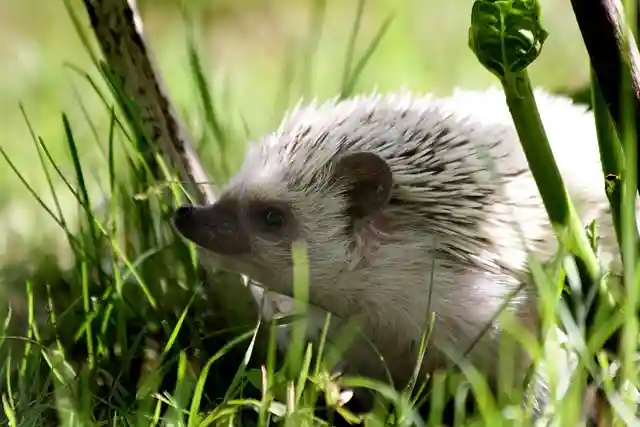
The African pygmy hedgehog is one of the most popular species kept as pets. Originating from Central Africa, these hedgehogs have a lifespan of around 4 to 6 years. They are known for their small size, reaching an average length of 6 to 9 inches. African pygmy hedgehogs come in various colors and patterns, making them visually appealing pets.
White Hedgehog
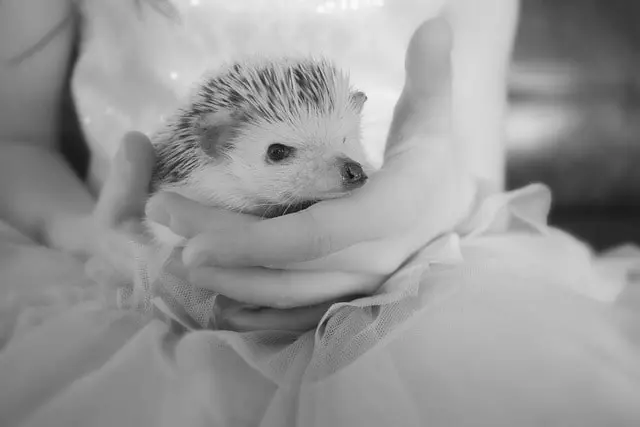
The white hedgehog, also known as the albino hedgehog, is a rare variant characterized by its white fur and pink eyes. This unique coloration is the result of a genetic mutation that inhibits the production of pigmentation. White hedgehogs require special care, as they are more sensitive to sunlight and may have vision impairments.
American Hedgehog

The American hedgehog, also known as the Eastern or North American hedgehog, is native to North America. These hedgehogs have a stout build and are covered in coarse, sharp spines. American hedgehogs are primarily insectivores and play a crucial role in controlling populations of insects and other invertebrates in their natural habitat.
Hedgehogs Characteristics
| Characteristic | Description |
|---|---|
| Physical Appearance | |
| Size | Small, typically 5 to 12 inches (12 to 30 cm) long |
| Weight | Varies by species, generally 0.5 to 2 pounds (200 to 1000 grams) |
| Color | Spiny coat with brown, white, or gray quills |
| Soft underbelly fur in various shades | |
| Spines and Defense | |
| Spines | Cover most of the body, serve as protection |
| Defensive Behavior | Curl into a ball when threatened, exposing spines |
| Can hiss, click, and puff when feeling threatened | |
| May charge at perceived threats | |
| Diet | |
| Diet | Omnivorous, primarily insectivorous |
| Eat insects, worms, small vertebrates, and plants | |
| Require a balanced diet for health | |
| Habitat | |
| Natural Habitat | Various, including woodlands, grasslands, and gardens |
| Nest in burrows, under shrubs, or in dense foliage | |
| Hibernate during winter in some regions | |
| Reproduction | |
| Reproduction | Mating season in late spring or early summer |
| Gestation Period | About 30 to 40 days |
| Litter Size | Typically, 4 to 6 hoglets |
| Maternal Care | Females raise and protect young |
| Lifespan | |
| Lifespan | In the wild, 2 to 5 years; up to 10 in captivity |
| Activity | |
| Nocturnal | Primarily active at night |
| Solitary | Often solitary, except during mating |
| Conservation | |
| Conservation Status | Varies by species; some are threatened or endangered |
| Threats | Habitat loss, road mortality, and pollution are major threats |
| Conservation Efforts | Efforts to protect and conserve hedgehog populations |
Hedgehogs belong to the family Erinaceidae and are native to Europe, Asia, and Africa. These small mammals have a distinctive appearance, with their spiky quills providing excellent protection against predators.
Hedgehogs are typically nocturnal creatures, meaning they are most active during the night. They have a keen sense of smell and hearing but have poor eyesight. Hedgehogs are known for their curious and somewhat shy nature, but with proper care and handling, they can become affectionate and sociable pets.
Hedgehog family and Baby hedgehogs
Baby hedgehogs, often called hoglets, are adorable and tiny versions of their adult counterparts. They’re born hairless and blind, relying entirely on their mother for warmth, protection, and nourishment. As they grow, their spines begin to emerge, gradually replacing the soft quills. Baby hedgehogs typically stay with their mother for several weeks until they’re ready to venture out on their own. During this time, they learn essential skills like foraging for food and navigating their surroundings. Watching baby hedgehogs grow and develop is a delightful experience for anyone fortunate enough to witness it.
Habitat Setup of Hedgehogs
Creating a suitable habitat is vital for your hedgehog’s well-being. Here’s a step-by-step guide to setting up an ideal living environment:
Cage Selection: Choose a spacious cage that provides ample room for your hedgehog to explore. A minimum size of 24 inches by 24 inches is recommended, with a solid bottom to prevent injuries. Avoid wire-bottom cages as they can cause foot problems.
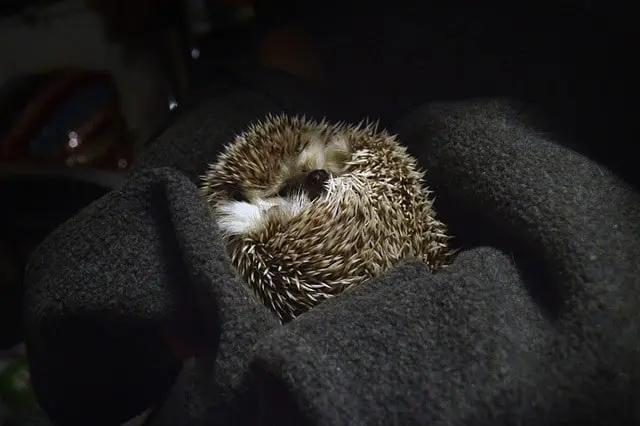
Bedding: Select a safe and comfortable bedding material for the cage. Options such as fleece liners or recycled paper bedding work well for hedgehogs. Avoid cedar or pine shavings, as they can be harmful to their respiratory system.
Temperature and Lighting: Maintaining the right temperature is crucial for hedgehog health. Aim for a constant temperature between 72-80°F (22-27°C) in the habitat. Provide a heat source like a ceramic heat emitter or a heating pad, ensuring there’s a temperature gradient within the cage. Use a low-wattage red or blue light for the hedgehog’s natural lighting cycle.
Hideouts and Enrichment: Hedgehogs love to hide, so provide cozy hiding spots like igloos or tunnels. Incorporate toys, tunnels, and exercise wheels to keep them mentally stimulated and physically active. Ensure all items are safe, non-toxic, and appropriate for hedgehogs.
Cleaning and Maintenance: Regularly clean the cage to maintain hygiene. Replace bedding as needed, and thoroughly clean the cage at least once a week. Hedgehogs are generally clean animals, but maintaining a clean environment is essential for their health.
Diet and Nutrition: A well-balanced diet is vital for your hedgehog’s overall health. Here’s a breakdown of their dietary needs:
Main Diet
High-quality commercial hedgehog food should form the basis of their diet. Look for brands specifically formulated for hedgehogs, as they contain the necessary nutrients. Ensure the food has a protein content of around 30%, with low fat and fiber content.
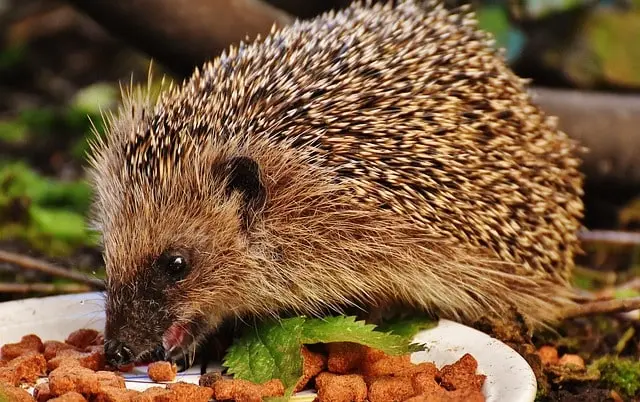
Supplemental Foods: In addition to commercial food, offer your hedgehog small amounts of fresh fruits, vegetables, and insects. Suitable options include mealworms, crickets, apples, bananas, and leafy greens. Remember to introduce new foods gradually and observe any adverse reactions.
Fresh Water: Provide a shallow dish of fresh water at all times. Use a sturdy bowl that won’t tip over easily. Monitor the water level and cleanliness regularly.
Health and Care
Ensuring your hedgehog’s health and well-being is essential for a happy and long life. Here are some important considerations:
Regular Veterinary Check-ups: Schedule regular check-ups with an exotic animal veterinarian who has experience with hedgehogs. They will conduct thorough examinations, provide vaccinations if necessary, and address any health concerns.
Nail Trimming: Hedgehogs’ nails can grow long and sharp, potentially causing discomfort or injury. Trim their nails regularly using pet nail clippers designed for small animals. Be cautious not to cut into the quick (the pink part inside the nail).
Bathing: Hedgehogs don’t require frequent baths, as they are generally clean animals. However, if they get dirty, use a shallow sink or basin with warm water and mild, unscented shampoo formulated for small animals. Ensure the water level is low to prevent accidents.
Hedgehog Health Hazards
Hedgehogs, those enchanting garden wanderers, are not immune to health challenges. Below is a list of ailments that can affect these prickly pals:
- Respiratory Woes: Poor living conditions or temperature fluctuations often trigger respiratory infections in hedgehogs.
- Obesity Blues: Overindulgence in high-fat diets can lead to obesity, a common problem in captive hedgehogs.
- Dental Dilemmas: Dental issues, such as overgrown teeth, can cause discomfort and affect their ability to eat.
- Mites and Ticks: External parasites like mites and ticks can torment hedgehogs, causing itching and skin problems.
- Hedgehog Wobbly Syndrome: A mysterious ailment characterized by head tilting and balance problems, often attributed to viral infections.
- Gastrointestinal Troubles: Digestive problems, including constipation and diarrhea, can afflict hedgehogs due to dietary imbalances.
- Anointing Anomalies: While not a disease, self-anointing with toxic substances can lead to health issues.
- Heart and Liver Issues: Hedgehogs can suffer from heart disease and liver problems, particularly in older individuals.
- Cancer Concerns: As in many animals, cancer can affect hedgehogs, often seen as skin tumors.
- Injury Incidents: Accidental injuries, especially limb fractures, can occur in captivity.
Socialization and Handling
Gradually introduce your hedgehog to regular handling to build trust and strengthen your bond. Handle them gently, supporting their body and avoiding sudden movements. Provide supervised out-of-cage time for exercise and exploration in a secure area.
Hedgehog Habitat
Natural Environment: In the wild, hedgehogs can be found in various habitats, including woodlands, grasslands, and hedgerows. They are known to dig burrows to create nests and seek shelter during the day. Hedgehogs are nocturnal creatures, preferring to venture out in search of food during the night.
Domestic Hedgehog Habitat: When kept as pets, hedgehogs require suitable enclosures that mimic their natural habitat. A spacious cage with hiding spots, such as tunnels or igloo houses, is essential. The enclosure should be lined with soft bedding material, such as fleece or paper-based bedding, to ensure their comfort. It’s crucial to maintain a warm and draft-free environment for domestic hedgehogs.
Hedgehog Diet
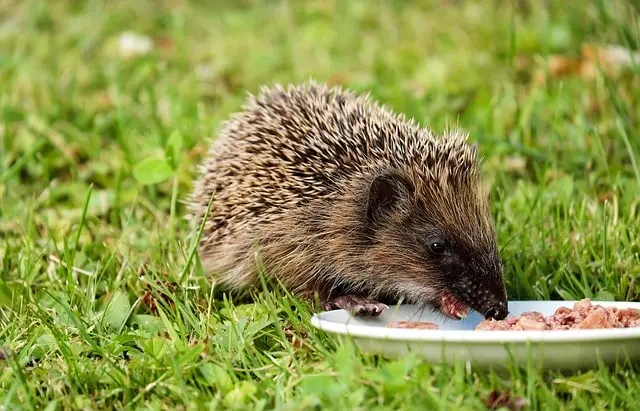
What do hedgehogs eat in the wild?
In the wild, hedgehogs primarily feed on a diet consisting of insects, snails, slugs, and various small invertebrates. They are opportunistic feeders and have a keen sense of smell, which helps them locate their prey. Hedgehogs have a high metabolism and require a protein-rich diet to meet their nutritional needs.
Feeding Domestic Hedgehogs
When it comes to feeding domestic hedgehogs, a balanced diet is vital for their overall health and well-being. Commercial hedgehog food is available and serves as a convenient option, providing a combination of essential nutrients. In addition to this, offering occasional treats of fruits, vegetables, and live insects can provide enrichment and add variety to their diet.
Owning a Hedgehog
Legal Considerations: Before deciding to own a hedgehog, it’s good to check the local regulations regarding their legality as pets. In some areas, owning a hedgehog may require permits or be prohibited altogether. Familiarize yourself with the laws and regulations to ensure a legal and responsible ownership experience.
Housing and Enclosure: Providing a suitable enclosure for your hedgehog is essential. A cage with ample space, proper ventilation, and secure latches is necessary to prevent escapes. Additionally, hedgehogs require hiding spots, exercise wheels, and toys for mental stimulation. It’s important to maintain cleanliness and provide fresh water and food regularly.
Handling and Care: When handling a hedgehog, it’s important to approach them gently and avoid sudden movements. Supporting their body properly and allowing them to uncurl from a defensive ball is crucial for their comfort. Regular grooming, including nail trims and bathing, is necessary to maintain their hygiene. It’s also important to schedule regular veterinary check-ups to ensure their overall health.
Fun fact1: Hedgehogs
Hedgehogs are known for their remarkable ability to roll into a tight ball as a defense mechanism, effectively protecting themselves with their spiky quills.
Conclusion
Hedgehogs are fascinating creatures that make unique and captivating pets. By understanding their natural habitat, dietary needs, and proper care2, you can provide a fulfilling and enriching life for your hedgehog companion. Remember to prioritize their well-being and seek professional guidance when needed. Enjoy the delightful company of these spiky little creatures.
Frequently Asked Questions (FAQs)
Can hedgehogs be kept as pets?
Yes, hedgehogs can be kept as pets. However, it’s important to check the local laws and regulations regarding their ownership.
Are hedgehogs nocturnal animals?
Yes, hedgehogs are primarily nocturnal creatures, meaning they are most active during the night.
How long do hedgehogs live?
On average, hedgehogs have a lifespan of 4 to 6 years, although some individuals may live longer with proper care.
Can hedgehogs swim?
Hedgehogs are not natural swimmers and may struggle in the water. It’s important to avoid exposing them to deep water to prevent accidents.
What should I do if my hedgehog loses quills?
Hedgehogs naturally lose and regrow quills as part of their normal shedding process. If you notice excessive quill loss or other signs of distress in your hedgehog, it’s advisable to consult a veterinarian. They can provide proper evaluation and guidance.
Sources, References, and Footnotes
“Common Diseases Of Hedgehogs”. Bowmanville Veterinary Clinic.






